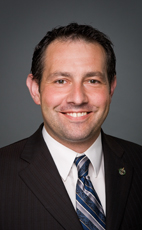Mr. Speaker, I am speaking in support of Bill C-560, which is the bill to amend the Divorce Act to make equal shared parenting arrangements for children following the divorce of their parents, except in proven cases of abuse or neglect.
I must admit that when this bill was first tabled and started to get some public attention and I started to pay attention to it, I was a bit surprised to see how controversial it became. I expected that most people would be in favour of it. That is part of the reason we have debate. It is because sometimes assumptions are challenged. I will say that the arguments against the bill seem as sincere as the arguments in favour of it.
I do not want to say anything about the intent of people who disagree with me on this bill. However, I will say that at home, when I have the occasional constituent come to talk to me about divorce law and family law problems, without exception, the problems have been fathers feeling that they are not getting fair representation through the courts and that the whole system is stacked against fathers having access to their children.
I want to make very clear that my support for this bill is not about preserving fathers' rights. It is not about mothers' rights. It is about the children's rights. It is not just about their rights but about the good of the children. When we talk about the good of the children, sometimes I wonder why we always say, “it is for the good of the children”. Why do children get this emphasis that other human beings do not get? It is not that children are more important. It is that children have not done anything to cause the grief they receive because of the mistakes adults make. Also, children just happen to be the people who will turn into adults who run the world, and if we have the children's best interests at heart and in mind, and we actually look after the children's best interests, by extension, we cannot fail in looking after the best interests of society as a whole.
Beyond children in and of themselves, when we have the best interests of families at heart and the best interests of families in our minds, we look after the interests of society, because family is the fundamental unit of society. When we do harm to the family, we cannot avoid doing harm to society. Decisions we make in this place, or any other place where we make decisions for all of society, must focus on children, and not just on children as individuals but on children as parts of families.
We live in a time when most men and boys are essentially fatherless. If men and boys are fatherless, so are the daughters. We live in a time when we lament violence against women, when we lament irresponsibility. Without fathers, we cannot teach our boys to treat women properly, and it is more difficult for daughters without their fathers to have a sense of who they are as well. Whatever the circumstances, when children do not have a father in the home, they find themselves on their own to figure out life, and they find out that it is a lonely place to be. They will often be ruled by their fears and anger and boredom, when lots of times all they seek is the affection of a father. There are many addictions that come from this fatherless place within them, a fundamental uncertainty in the core of their being.
In our art, our literature, our poems, our movies, our novels, there are so many written about children seeking out their parents, and in particular, their fathers. Lots of real life stories are about adopted children who at a certain age have an inner angst in their soul to find out who their parents are. They love their adopted parents and see them as their parents, but there is something inside of our souls that seeks to be connected with our fathers and our mothers.
The bill is in response to the fact that in today's current divorce law, it is fathers who are usually left out of the children's lives, and by extension, the children are left out of the fathers' lives.
What does fatherhood do? What does it teach people in general, kids in general? It is the new-found position as a requirement of the good life. It shows people how to fulfill duty. It binds us to other people in general. It binds us for real to a woman or to another adult. It is the only thing that still can do this.
Nowadays, marriage is instantly reversible and a negotiable contract, but fatherhood is not. Through this law, we will bring fathers closer to the hearts of the children and the children to the fathers.
The bill may not be perfect yet, but it is on the right track. We need to bring it to committee so we can examine it more closely. The concerns people have brought up about the bill can be addressed at committee. We cannot let it die at this point. We need to bring it to the next level. I encourage everyone in the House to vote in favour of the bill to bring it to committee.

